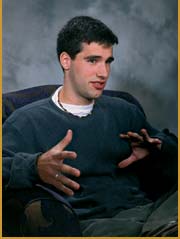| |
|
| |
|
|||||||

|
Ask Senior Ryan Coller what he studies, and he'll tell you bacteriology and philosophy. Ask him why, and he'll say he likes how philosophy informs his research. "Philosophy stresses issues from different perspectives," he explains. "Doing research drives home all the information you learn in class; it adds another perspective to the science." The interplay between Coller's majors became evident soon after he received a Wisconsin/Hilldale Undergraduate/Faculty Research Fellowship, part of the university's commitment to enriching undergraduates' educational experiences. As one of several dozen students from across campus, Coller received a $3,000 stipend and the chance to work one-on-one with a professor. While some students might have used the funding to take their research abroad, Coller chose to work with UW-Madison bacteriologist Timothy Donohue to investigate the assembly process of certain molecular proteins. For Coller, the greatest benefit has been the hands-on research. "It's incredibly difficult to really grasp how research and basic science are done without doing it yourself," he explains. His adviser adds, "The Hilldale fellowships provide critical support so that students can take advantage of research opportunities at campuses like ours." By writing research proposals, conducting experiments,
and sharing the results, Coller says he has broadened his scientific understanding;
he has learned "another side of science." The undergraduate research experience allows students like Coller to grow not just intellectually, but also personally. After imparting technical expertise, Donohue says he stood back and watched Coller "learn, pose his own questions, and generate the self-confidence to take his research into new areas." In fact, Donohue describes his interactions with Coller as being similar to those he has with graduate students."It can be intimidating approaching professors," notes Coller, "but working directly with them requires you to move past some of those feelings." Through the Hilldale program, Coller made valuable connections. Some have already helped him with the next stage of his life — medical school. "Jim, one of the postdocs, helped me write drafts of the personal statement," he recalls. "Another gave me a typewriter so I could fill out applications." Coller, who will graduate in May, has applied to medical schools, including UW-Madison.
|
||||||
|
"For many years, UW-Madison has been a leader in scholarly research. This research involves preeminent researchers, excellent facilities, real-world applications, and learning opportunities for both students and the public. All these components will be enhanced by the research priority." — Martin Cadwallader,
|
Developmental biologist James Thomson's leadership in research on embryonic stem cells garnered international recognition, and the cover of Time.
|
||||||
|
|
|
|